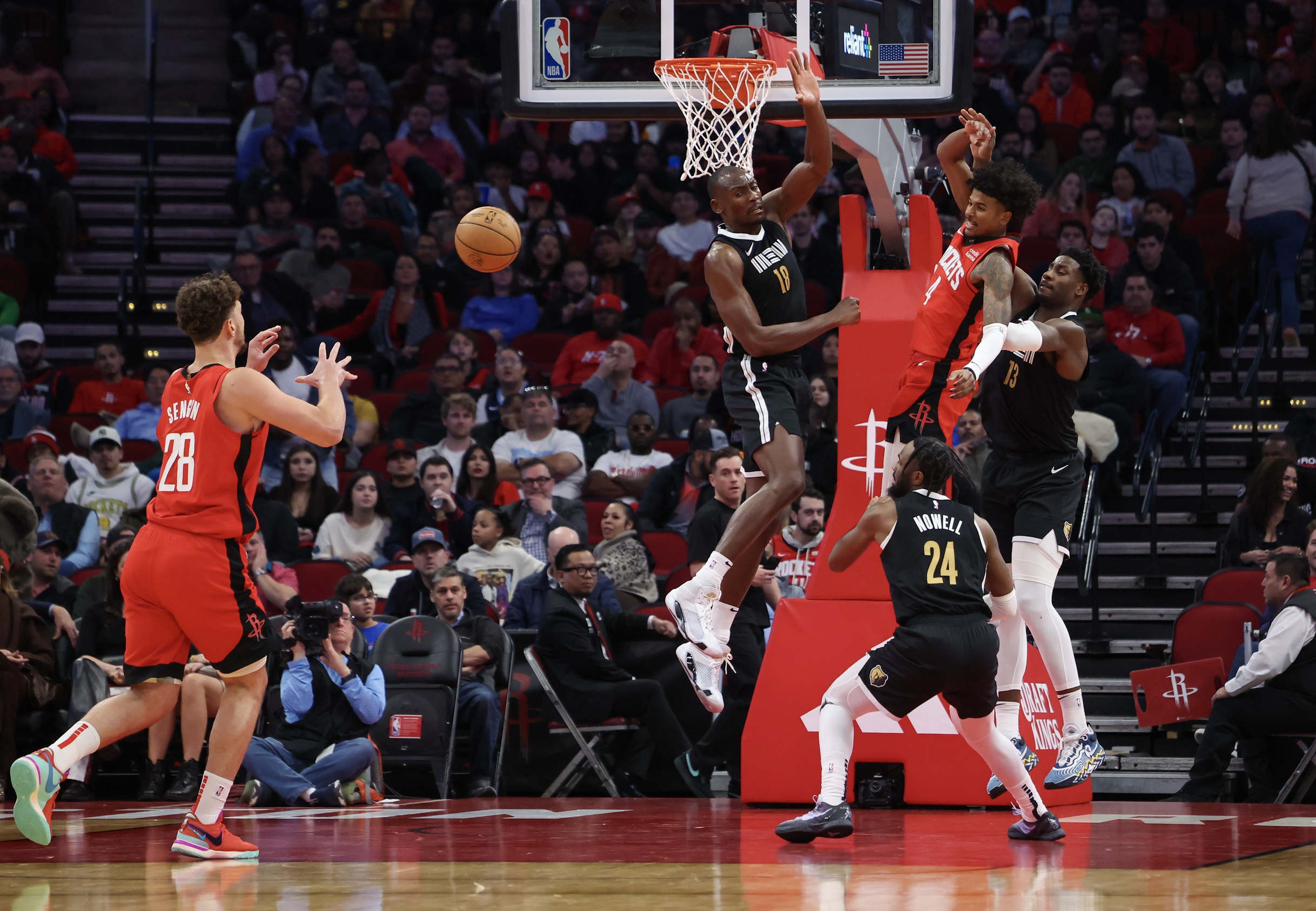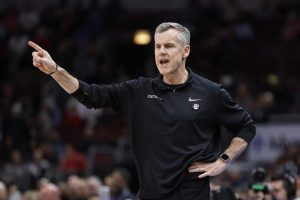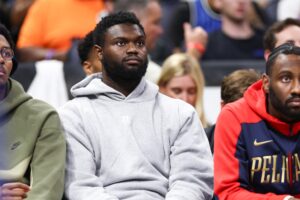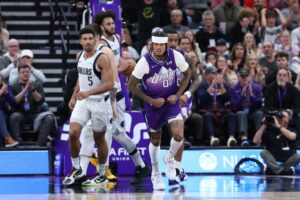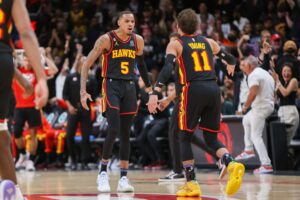The Houston Rockets need a leap from one of their fourth-year players next season. The Houston Rockets need a leap from one of their fourth-year players next season. But how dramatic can a fourth-year leap be? To account for the ever-changing style and culture of the league, it’s best to look at only the current generation of NBA stars. Who among them then took the biggest leap in year four, and can either of the young Rockets hope to replicate it?
Rockets Need An All-Time Fourth-Year Leap
Alperen Sengun had a near-All-Star season in his third year, but if Houston is going to have a chance in a brutal Western Conference next season, then “near” isn’t going to cut it. The fourth-year player the Rockets would need to take an even bigger leap would be Jalen Green. His production actually ever so slightly dipped from year two to year three. That was obviously down to a new coaching philosophy rather than any actual regression on Green’s part. Green even showed some genuine improvement in his decision-making at times. But the new coaching philosophy was about winning. As a result, Green has to be careful that it doesn’t wind up leaving him behind.
Green and Sengun are both already good players who are aiming to become stars in year four. So, in a similar vein to the recent interpretation of the Most Improved Award, the pool for comparison will be limited to stars and former stars.
The Rockets Witnessed The Best Leap First-Hand
The best fourth-year leap among active players was almost assuredly from Houston’s own James Harden. There’s a caveat to that, though. He was only “Houston’s own” starting that season, hence the leap. Harden went from 16.8 to 25.9 points per game, 3.7 assists to 5.8. He was a first-time All-Star and made third-team All-NBA. But all of that was powered by an increase of nearly 7 minutes per game and an extra 76 starts, not to mention the keys to the entire offense. The season before, playing with the Oklahoma City Thunder, he was the Sixth Man of the Year. The fact is, Harden was ready for a starring role and just hadn’t been given the opportunity yet.
So the very best fourth-year leap is realistically unattainable to either of the current Rockets. Sengun more or less got the keys to the offense last season. While he had an impressive leap of his own, he’s going to need to find further improvement largely within himself. Head coach Ime Udoka could take a page out of the Kings’ playbook and start running more Sengun hand-offs for Houston’s shooters. That would help pad his assist numbers, along with potentially juicing the Houston offense. But Sengun needs to improve his own shooting more than anything else. Both at the free throw line and from midrange.
The Grass Isn’t Always Greener On The Other Side
Green actually had his own keys to the offense largely taken away from him last season. If he can prove to Udoka that his run at the end of the year wasn’t a fluke, he might be able to get them back. It wouldn’t be the difference between starting 2 games and starting 76, but it could conceivably contribute to a significant boost in his production. Most of the largest leaps have significant environmental changes as the nucleus. Though they’ll both be starting with the Rockets next season, Green is more likely to benefit from that than Sengun.
Do The Rockets Have To Pick A Leap?
Speaking of significant environmental changes, Stephen Curry‘s fourth-year leap was due to a couple of them. First of all, he was injured during his third year, to the extent that he went down from his 19 points per game in year two. But he benefited most in his fourth year from the departure of his backcourt competitor, Monta Ellis. He went from 14.7 to 22.9 points per game. While Curry’s leap wasn’t quite enough to crack an All-Star team, it did help boost the team’s wins from 23 to 47 games.
One could make the case that Curry and Ellis’ example opens up an argument for trading one of Sengun or Green. Green’s production certainly improved during the late-season absence of the Turkish big. He almost certainly benefited from the spacing of Jabari Smith Jr as a stretch five. But Smith isn’t a long-term solution at center, and stretch bigs who don’t create rebounding concerns are a rare commodity. Green will have to learn to play with a true big, and though by no means a lob threat, Sengun has his own ways of making Green’s job easier. Curry and Ellis played essentially the same position with contrasting styles. One of them had to go. Green and Sengun should be able to work together.
An Unconventional Path To Super-Stardom
Another fourth-year leap to rival even Harden’s was that of Giannis Antetokounmpo. His numbers increased across the board in year four. He went from 16.9 points, 7.7 rebounds, and 4.3 assists to 22.9, 8.5, and 5.4. Blocks and steals went up as well, all with only 0.3 extra minutes per game. He was a first-time All-Star, a first-time All Defensive Team member, and made second-team All NBA. Unsurprisingly, that kind of leap brought him the Most Improved Player award.
What’s interesting about Giannis’ case is that there were actually no major overhauls with the same team and the same coach. Another leap would come later, of course, when he’d become an MVP under head coach Mike Budenholzer. His year four leap says more about what an unusual prospect he was entering the league. He came in extremely raw, his rookie season, after being the 15th pick in the draft, he averaged only 6.8 points per game. Giannis did actually finish third in Most Improved voting in year three.
Sengun’s situation is more similar than Green’s. While the Turk impressed in his rookie year, he played limited minutes as only the 16th pick. Sengun won’t undergo the same physical transformation that Giannis did, of course. But if he’s been as serious about fine-tuning his body this off-season as it seems, then he and the Rockets might make a leap of their own.
What About Everybody’s Favorite Comparison?
One of Sengun’s nicknames is literally Baby Jokic after Serbian MVP Nikola Jokic. Besides a fondness for unorthodox passes, the two players had remarkably similar statistics across their respective third years. It, therefore, seems obligatory to look at the Serb’s fourth year too.
Jokic’s most memorable leap was obviously the year after the bubble. He maintained the sleeker Orlando appearance that took his team to the Western Conference Finals and produced an all-time regular season. He went from just shy of 19.9 points per game to 26.4 also adding an extra assist and an extra rebound. His percentages rocketed too. While his three-point percentage is variable from year to year he shot 38 percent from beyond the arc in 2021 and 52 percent from the field to 56 percent, and he hasn’t looked back. It’s also the first year he won MVP, and he hasn’t looked back further than runner-up in the time since either.
However, as long as it may seem that Jokic has been winning MVPs, that was actually his sixth season in the league. The statistical progression from year three to year four was much less remarkable. However, he did help power the team to an extra eight wins and a second seed in the conference. A fully healthy season from veteran Paul Millsap did undoubtedly help with that.
Baby Steps For Baby Jokic?
This is a more competitive Western Conference than the dark days when few really dared to challenge the seemingly unbeatable Golden State Warriors. But there are plenty of improvements around the margins that Sengun could make. He could boost his lateral quickness, communication on defense, or shot-calling on offense. There are a multitude of under-the-box score adjustments that could help the team pick up extra wins. If the team somehow found itself an early contender for top-six seeding, Sengun would be hard to deny an All-Star spot with just a repeat of last year’s numbers. Ultimately, winning games will be how the Rockets’ two fourth-year players will be judged, whether there’s a statistical leap or not.
The Last Word
Looking at the most impressive fourth-year leaps among current stars, it becomes apparent that an environmental change is typically a required catalyst. Meanwhile, the Rockets adopted an off-season strategy of wait-and-see this offseason. A dramatic leap for either fourth-year Rocket might be too much to hope for then. That could leave the Rockets on the outside looking in as far as the Western Conference playoff race is concerned. But Green and Sengun will both have their own expectations of a leap this year. The Rockets will need that leap to materialize if they want to make major progress from last season.


